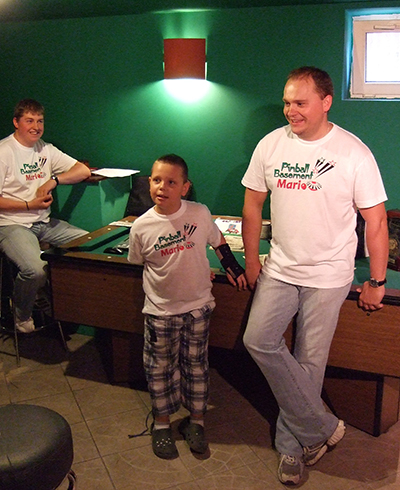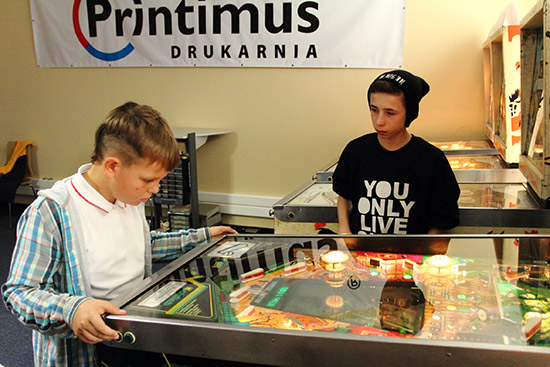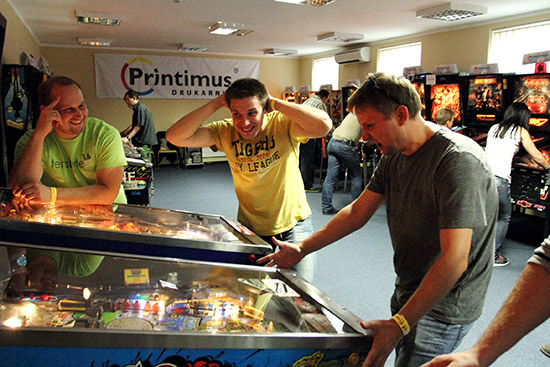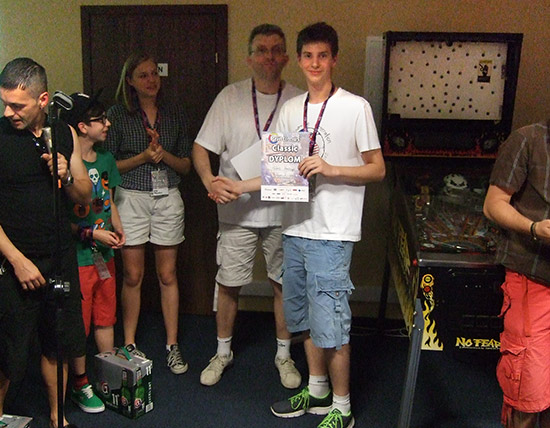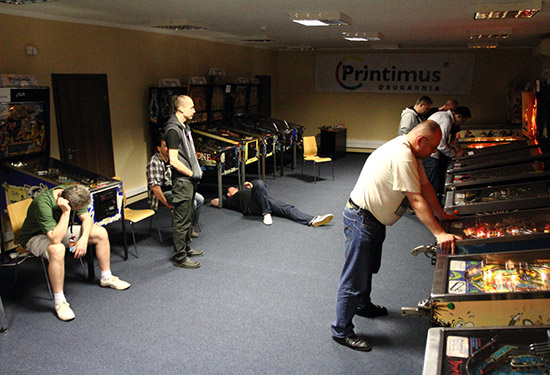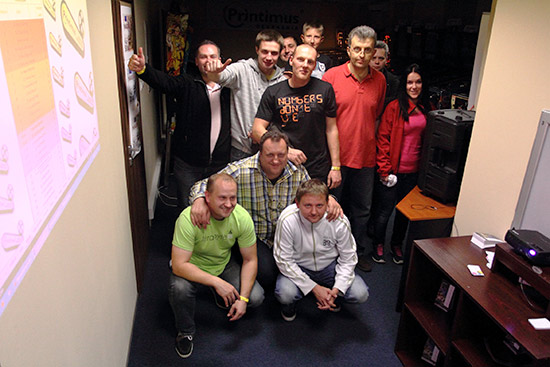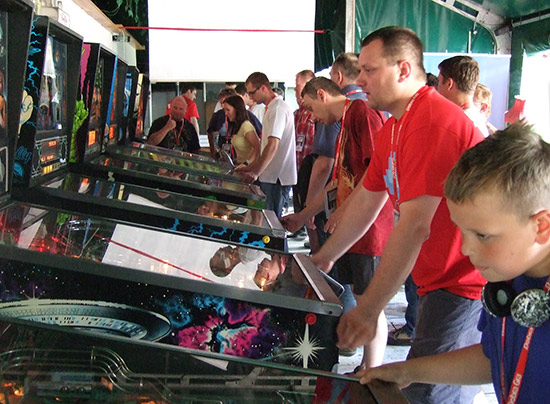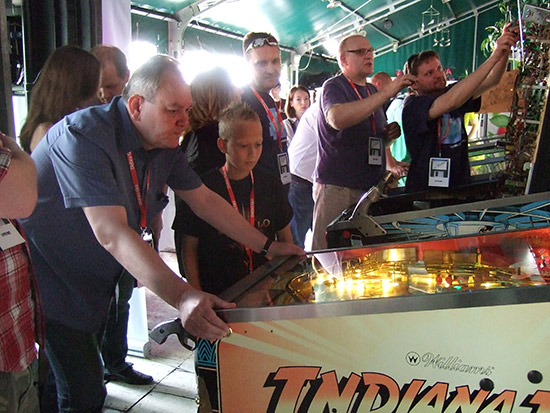|
|
Date: February, 2014 Report by Łukasz Dziatkiewicz It is a funny and rather bizarre curiosity that almost all the names of Polish tournaments held in 2013 started with the letter 'P'. Although not unique to last year, this naming characteristic became more widespread than ever over the past twelve months. But it's not all down to one company's name in the title - Printimus - even though it is the patron and co-sponsor of our league and most of the tournaments associated with it, and despite the fact that it was at this printing company based in Bytom that nine of the twelve Polish tournaments in 2013 were held.
The city of Bytom used to be called Little Wien (Vienna). In 2013 Bytom became the inaugural winner of the title Nicest City in Poland following an internet vote.
No, it is mainly just coincidence, although we do like to use English words in our Polish language. Incidentally, in Polish we also spell our country's name with a 'P' - Polska, which might seem obvious, but England for us is ‘Anglia’, Philipines are ‘Filipiny’ and Spain is ‘Hiszpania. But pinball in Polish is 'flipper' - more 'P's, but this time inside the word. However, sometimes we will use the word 'pinball' as a synonym in the name of tournaments. Talking about Poland – quite a large country on a European scale, but small one globally - like many other countries it contains a number of special regions. One of the most unusual is Silesia, which after Second World War became mostly Polish, with some small parts inhabited by Czechs and Germans. The history of Silesia is very complicated, especially in the years following the First World War. There were three Polish uprisings in the years 1919, 1920 and 1921, against Germany and in support of incorporating a larger part of the region into Poland than had originally been proposed. It is important to realise that by the end of the First World War in 1918, Poland hadn’t existed as an independent state for 123 years! Finally, the Polish-German border running through Silesia was redrawn to make it more favourable to Poland. From then until the Second World War, this region had a great amount of autonomy. During the German occupation, Silesia was incorporated by Third Reich, but after the War almost all of Silesia became part of Poland. Poland got full independence from the Soviet Union in 1989, and the Silesian Autonomy Movement was founded the very next year. This is now the strongest minority movement of its kind in our country. Lastly, although it’s not a pinball thing, I haven’t explained why Silesia is so important. It's because of the “black gold”, the name we give to the coal with which the area is rich. So there are lots of mines, ironworks and heavy engineering companies located in the region. So as I explained, Silesia is very important for Poland and has existed as part of the country since the Polish state was established, but it also has a key role also in the history of Polish pinball. The first Polish games were imported at the start of the 1970s by Silesians who had families or other relations living in West Germany. During this time, the other main way pinballs were brought into Poland was by sailors through Poland’s Baltic ports. The latest chapter in the history of Silesian pinball was begun in 2007 when Marcin Krysiński with his son, Hubert and daughter, Dorota came to Warsaw to compete in the Polish Pinball Championships. Marcin is originally from Wrocław, which is the capitol of Lower Silesia, before he moved to the Upper Silesia area twenty years ago. Since 2007 he has never missed any of these Championships, and two years later his company Primtimus began producing almost all the printed material for the event, while also sponsoring the pinball machine which has traditionally been the main prize ever since the competition began.
Mariusz “Mario” Tkacz is also Silesian, but from the city of Myslowice. The seventh Championships in 2008 was his first ever pinball tournament, but despite that he won! He took home the grand prize which was a rare Secret Service pinball, and since then Mariusz has also returned to Warsaw for each subsequent Championships. After Mariusz ‘s first Warsaw triumph, he started to build his own pinball collection and then organised two great tournament seasons in 2011 and 2012.
Mariusz didn’t think he would be able to continue holding competitive events in 2013 (although that had changed by the end of the year), so Marcin, after hesitating for some time and following suggestions and persuasion from me, decided to organise tournaments at his company’s premises in the city of Bytom, 9 miles northwest of Katowice. Katowice – and I promise this is the last Silesian city I’ll refer to in this article - is the largest city in Silesia by both area and population. I decided it would be best if I interviewed Marcin to find out about his initiative called Printimus Pinball. I know this is standard question but I have to ask it anyway; how did pinball first appeared in your life? When I was 7 or maybe 8 years old, I used to stop by at the local pub in Wrocław where I lived, where they had two pinball machines – Bronco and other one whose name I don’t remember but it was out of order most of the time. So I played Bronco a lot considering the amount of allowance such a young boy could receive at that time. It required great patience to get a chance to play in those days, since the machines were so popular. I would wait for as long as two hours for my turn. Eventually, I got so into pinball machines that I started to dream of owning one.
You got some of your machines simply because you like them, but others - like Bronco - are due to nostalgia. Yes. I have a wish-list, and step-by-step the machines from it land in my collection. I try to acquire the machines I spent the most to play in the past. That’s why I have Bronco, Mata Hari and some modern ones: Terminator 2, Getaway and Fish Tales.
However the pinball machine I am most proud of having in my collection is number one on my list – Haunted House.
The other machines in my collection were purchased a little randomly depending on the offer and the deal. I can say my wish-list contains 20-25 machines, more than half of which are electromechanicals and early solid-states. There are also several machines built by Stern in this century. You have quite a large home, however you decided to locate the pinballs in your company building. Why was that? We could not run any tournament at my home, so having my collection in the office is more useful since we can have more than 30 people there.
We also have some PR benefits coming from this. Virtually everyone who visits our office is just fascinated when seeing the machines, and I can also promote pinball to the people I work with and their families. Collecting pinballs, sponsoring championships and PSF, organising tournaments, this is quite a big commitment, but you have much bigger plans, and even some dreams! Actually, I did not plan to collect pinball machines at all. It has just happened. My two first pinball machines - Grand Lizard and Big Guns - I just bought out of the blue, but it wasn't long before they were joined by the next one - Police Force. I sold those first two machines pretty quickly, and bought another - Terminator 2.
Then I had another ‘short-term purchase’ - Hard Body - which I had to sell due to lack of the space both at home and at the office. So, I had had only two pinball machines for some time – one at my office and the other in my son’s room. After we had moved our company base to the new, bigger building two years ago, some extra empty space became available. In fact, I should say “used to be empty” as there are… twenty-five pinball machines there right now. Not every machine is mine, but nevertheless they look just great.
Whoever visits us and sees the entire collection is just amazed. This alone gives me a great deal of satisfaction. Sometimes a visitor would play couple of games, and almost everyone wants to return and play again. I think this is pretty unusual – one comes into the office to do business and all of a sudden there is a 900 sq. ft. hall full of pinball machines! To take advantage of this situation I plan to open Printimus Pinball - a club or in-group. We intend to let any of its members visit us on certain weekend days to play pinball and spend some quality time with both family members and other pinball fans.
Two of your main tournaments have rules not seen before in Poland. I like changing things, improving existing systems and eliminating flaws. Since the current tournament system used in Poland has – in my opinion – more cons than pros, having the host’s privilege I decided to produce other systems. One thing led to another and I came up with several tournament systems:
You have also arranged some side tournaments. Yes – two, and some small contests, let’s say, for fun.
You won the first edition of Elite and Classic, and in second place in both was your son. Congratulations, but some people could think that you have an advantage, like maybe you play a lot.... I was surprised too. I haven’t practiced much beforehand. Maybe other players were just extremely kind? I recall the Classic tournament wasn’t decided until very last ball on Mata Hari. In addition, this not the first time the owner of the machines wins the tournament they organise. Maybe this happens due to some kind of special treatment the machines grant their owner? Hubert despite being 16 years old is a very good player already. He may succeed in many tournaments to come. For example, he ended up in 7th place in a tournament we attended in Austria in June. He won one of the tournaments held at Printimus Pinball and came second several times. Hubert was also second in this year's Printimus Elite Series (out of 41 players), third in the Classic Tournament during Printimus 2013 – 12th Polish Championship, and was fifth overall (out of 84 to participate in three different tournaments). Last but not least, he usually wins most of the one-on-one competition games we sometimes play.
Tell us about your plans for future pinball activities. As I mentioned before, I plan to start a pinball parlour under the name Printimus Pinball (as it will be located in the very building I have a print shop). This will be something unique both in our region and country. I would like this place to offer unforgettable entertainment for the family, and an opportunity for people to meet each other. We will offer everyone an opportunity to play REAL pinball.
However, my ultimate goal is to build my own pinball machine with the theme that would be closer to our national culture. Thanks to advanced technology I am closer to making this dream happen than ever. All I need to do is create the game design (I already have some ideas), graphics and put them all together with other elements available on the market. So who knows? I wish I had more time to spend on this. Maybe someday? But you also have something new to announce, right? I wanted to combine my pinball interests with my business activities, so I prepared an offer to all pinball tournament organisers around the world! It was accepted at the very top – by the IFPA itself. Everyone who organises an event under IFPA rules and regulations will be eligible to receive a free set of printing services that may be useful their event. This set consists of: posters, flyers, certificates (diplomas) and some number of design hours to prepare these things for processing (digital or offset printing). I expect my businesses to be promoted by the organiser in exchange for my involvement in the pinball players’ world. Whoever is interested in taking advantage of this offer should contact the IFPA or their respective Country Director.
You can also read the interview with Marcin in Polish and more about pinball in Poland (and Silesia in particular) on the Interia website.
Retro computing and gaming - what does that mean? It encompasses everything related to old computers and video games consoles, as you can see in this amazing promo video. Organiser Robert Łapiński, who is also a pinball fan, decided that some pinballs should be included as part of Pixel Heaven. He was right, because there is an obvious connection between those phenomena. Pixel Heaven was organised at a cult place for pinball in Poland – the club Społdzielnia CDQ where all the Polish pinball championships were organised and thus where our pinball roots lie. That’s why pinball was such a natural fit for this event.
As the person who took care of pinball zone, I saw many people playing pinball with great pleasure, and some were really fascinated. For old boys (in this case that means thirty years and older) it was like a trip into the past, while for many youngsters it was a unique contact with a physical machine they only knew in video game form. For me, it was further proof that video games fans are a good source of potential pinball players.
The first day brought a tournament called the Flipper Heaven Cup with a total of 37 players taking part. There were no surprises in the group of winners – only very good, old hands players. First was Konrad Masłowski, second Daniel Kaczmarek and third Pawel Nowak. They received some video games and hardware from Pixel Heaven's partners, and some pinball goodies organised by me from Stern Pinball, Jersey Jack Pinball and PAPA.
You can watch this video about the Flipper Heaven Cup tournament. So it was, let’s say, a fairly typical small pinball tournament with just 6 machines, none of them especially old. So far nothing very special, BUT everything around Pixel Heaven was so different! So many working old computers and their ardent fans – youngsters who can’t remember them from the first time they were in use, and old timers for whom it is like journey into the past.
It wasn’t just a meeting and a show either. There were organised lectures, discussions, panels, mini-tournaments, demonstrations, and more. It wasn’t even only about computers, video games and related things like old computer magazines about them. Nor was it just about old-school and retro themes. For example there were a number of modern independent games also present on that weekend in June. Talking about non-computer and video game things, I got an opportunity to listen an interesting lecture about cult Polish comic book series called “Relax”. Pixel Heaven was an occasion to meet, listen and talk with people who been started the computer mania in Poland, especially representatives of the press and video game creators. There was one guy from France who is a real gaming legend - Frédérick Raynal, who is the designer of the cult video game Alone in the Dark. OK, I know this is an article about pinball, so no more about this event from me except to let you know that the organiser, Robert, has to say about next year's show:
More details can be found at: www.pixelheaven.pl and you can read more (in Polish) from Robert in this article. The second pinball – purely pinball – event was second edition of the Plaza Park Pinball Party - lots more 'P's there - held on the 24th and 25th of August in Dźwirzyno near Kołobrzeg on the Baltic coast.
This time however there were more machines – a total of 32 - and two days full of playing, because there was one main tournament and three sides - Elite (like in Bytom), Pinball 2000 (on both 2000 machines), and the second Mariusz’s Birthday Tournament.
All the results from these are published on the IFPA website. There was so much for everyone, including games, competitive play, emotions, prizes and people. But perhaps even more spectacular was the celebration of pinball’s nuptials with the Polish sea. Unfortunately organiser Marcin Kisiel has no pinball with a sea or oceanic theme, although you could say that his Popeye would have been a good choice. However he decided that Fish Tales would be a more appropriate selection.
Transportation and both group and individual photo sessions gave us so much fun! If you could see faces of sunbathers – they didn’t understand what was going on, what those people were doing, and why it was so funny. :-) Another 'attraction' was the power cut which lasted for about two hours. It was a widespread breakdown covering a large area and while it certainly caused us problems, think about the owners of shops and other places selling food, especially ice cream vendors. You can view more photos from the event on our PSF site. In addition, there are extra pictures on the web site of the local newspaper Gazeta Kolobrzeska, and a video report made by local TV station. At the end of November Marcin asked on our forum about choosing the exact date of next year tournament. PPPP is a special event because of place, the time, and the number of machines, but also because the main organiser is someone exceptional in our pinball community. He has the greatest number of machines, and he is first Pole to win a foreign tournament – the 2013 Belgian Open Pinball Championship followed by third place in the Hungarian Pinball Championship 2013. Congratulation Marcin – keep flippin’ and keep it up!
In my next report I’ll tell you all about our 12th Polish championship which predated the end of the 2013 season, and also about the last tournament of the year which was held in Mysłowice, which has returned as a venue despite it earlier looking as though there would be no more tournaments held there. As we reach the end of the pinball year you can see that, for us, 2013 was very Silesian! ;-)
Publishing a book about such a niche theme like pinball is very problematic. Luckily, after my prompting, Marcin Krysiński decided to print Waldemar Banasik's book. This man (Silesian, by the way! ;) is definitely the biggest pinball expert in Poland. Waldek (diminutive for of name Waldemar) wrote many articles for magazine “Interplay” and on our website. He knows key pinball figures around the world, many of whom he met personally.
His “Kulka dziką jest” title is a translation of Harry Williams’ phrase “The wild is ball” and must be considered a pioneering work in our country. The subtitle is: “Czyli rzecz o flipperach” which means “So something about pinballs”.
Banasik presents pinball history both in general terms and for him personally (he started as an operator), writes about pinball key persons (especially game designers) and the most famous titles. This is book which every Polish speaking pinball fan must have! This is what Waldek told Pinball News: During the 1980s in Poland, my partners and I bought our first pinball machine. This was a purchase for business purposes and only with time did I become interested in the history of pinball, the creators of these machines, the artists who created the backbox graphics and playing fields. I started writing about gaming machines due to my anger at the failures of the business. In the early nineties I went to gaming exhibitions in Paris and Rome to find out the news and purchase video game PCBs (Printed Circuit Board). At one such exhibition in 1995 I did not find a single thing interesting to purchase. Annoyed by the lack of good luck - which had somehow eluded me this time - I decided to use my previous experience working in radio to write an article about the exhibition. I took it to a bimonthly trade magazine, they liked it and published the material. Descriptions of pinball machines that came out that year were a large part of the article. After that it was smooth sailing, somewhat.
Pinball visionary and entrepreneur Harry Williams used to say, "The ball is wild", and to me that's the essence of these machines. Every game is different from the last, which each new play bringing something new. People have swung and swatted at things for ages, and here it has been reduced to a compact size, made available to virtually everyone. I think all of us need pure entertainment that needs no special effort to be achieved. Pinballs blink, shine, flash, play music and also give the impression that we can do something to damage them in return by sending a steel ball into the goal. It's a great way to recover from stress, but that's probably something a psychologist could tell you more about. Pinball has always been a training ground for technological innovations. They have come a long way from simple nail-studded boards to the latest generation of integrated circuits. There's a scene at the begining of Kubrick's 2001: A Space Odyssey where an ape throws a bone which then turns into a spaceship. Pinballs are a tiny bit like that, and definitely a lot easier to find than spaceships. In the leadership of Gierek (1971-1981), communist Poland opened up a little to the west. Western goods made their way into shops and the fist pinballs reached the arcades. Most of those were private imports, mainly from Germany. Silesia, at one time a part of Germany, had one colossal advantage compared to the other regions of the People's Republic of Poland. Many people had family living in Germany, which help them greatly with importing pinballs." You can e-mail Waldek for more information about ordering his book at:
© Pinball News 2014 |





